Eco2 cities: ecological cities as economic cities
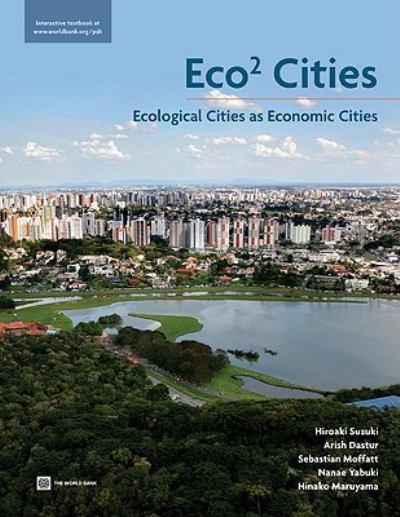
An overview of the ‘Eco2 Cities: Ecological Cities as Economic Cities’ Program, helping cities in developing countries achieve greater ecological and economic sustainability, also addresses proactive risk management.
Divided into three parts, part one is describes the approach, background and rationale, key challenges, and lessons drawn from cities which have managed to turn these challenges into opportunities. Part two outlines a City-based Decision Support System that introduces a set of core methods and tools to help cities as they develop their own Eco2 pathway towards applying the steps outlined in part one. Part three is a ‘Field Reference Guide’ containing background literature designed to support cities in developing more of an in-depth insight and fluency with the issues at two levels.
The Eco2 Cities Program is an integral part of the World Bank’s new Urban Strategy which is currently being developed in consultation with stakeholders. The Eco2 Cities Program is also complementary to the ongoing efforts the World Bank and its development partners are making in sustainable development and climate change.
|
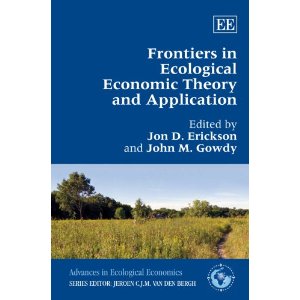 Frontiers in Ecological Economic Theory and Application (Advances in Ecological Economics) Frontiers in Ecological Economic Theory and Application (Advances in Ecological Economics)
Jon D. Erickson (Editor), John M. Gowdy (Editor)
Hardcover: 365 pages
Publisher: Edward Elgar Pub; 1 edition (June 7, 2007)
Language: English
ISBN-10: 1843768887
ISBN-13: 978-1843768883
Product Dimensions: 9.3 x 6.3 x 1.1 inches
Shipping Weight: 1.6 pounds (View shipping rates and policies)
Amazon Best Sellers Rank: #4,697,446 in Books (See Top 100 in Books)
Read more...
Collected Essays in Anthropology, Psychiatry, Evolution, and Epistemology
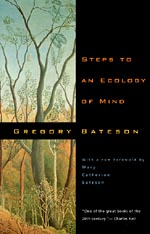
565 pages | 5 line drawings | 5-1/2 x 8-1/2 | © 1972, 1999
Gregory Bateson was a philosopher, anthropologist, photographer, naturalist, and poet, as well as the husband and collaborator of Margaret Mead. With a new foreword by his daughter Mary Katherine Bateson, this classic anthology of his major work will continue to delight and inform generations of readers.
"This collection amounts to a retrospective exhibition of a working life. . . . Bateson has come to this position during a career that carried him not only into anthropology, for which he was first trained, but into psychiatry, genetics, and communication theory. . . . He . . . examines the nature of the mind, seeing it not as a nebulous something, somehow lodged somewhere in the body of each man, but as a network of interactions relating the individual with his society and his species and with the universe at large."—D. W. Harding, New York Review of Books
"[Bateson's] view of the world, of science, of culture, and of man is vast and challenging. His efforts at synthesis are tantalizingly and cryptically suggestive. . . .This is a book we should all read and ponder."—Roger Keesing, American AnthropologistGregory Bateson (1904-1980) was the author of Naven and Mind and Nature.
CONTENTS
Foreword by Mary Catherine Bateson, 1999
Foreword, 1971
Introduction: The Science of Mind and Order
Part I: Metalogues
Metalogue: Why Do Things Get in a Muddle
Metalogue: Why Do Frenchmen?
Metalogue: About Games and Being Serious
Metalogue: How Much Do You Know?
Metalogue: Why Do Things Have Outlines?
Metalogue: Why a Swan?
Metalogue: What Is an Instinct?
Part II: Form and Pattern in Anthropology
Culture Contact and Schismogenesis
Experiments in Thinking about Observed Ethnological Material
Morale and National Character
Bali: The Value System of a Steady State
Style, Grace, and Information in Primitive Art
Comment on Part II
Part III: Form and Pathology in Relationship
Social Planning and the Concept of Deutero-Learning
A Theory of Play and Fantasy
Epidemiology of a Schizophrenia
Toward a Theory of Schizophrenia
The Group Dynamics of Schizophrenia
Minimal Requirements for a Theory of Schizophrenia
Double Bind, 1969
The Logical Categories of Learning and Communication
The Cybernetics of "Self": A Theory of Alcoholism
Comment on Part III
Part IV: Biology and Evolution
On Empty-Headedness among Biologists and State Boards of Education
The Role of Somatic Change in Evolution
Problems in Cetacean and Other Mammalian Communication
A Re-examination of "Bateson's Rule"
Comments on Part IV
Part V: Epistemology and Ecology
Cybernetic Explanation
Redundancy and Coding
Conscious Purpose versus Nature
Effects of Conscious Purpose on Human Adaptation
Form, Substance and Difference
Comment on Part V
Part VI: Crisis in the Ecology of Mind
Form Versailles to Cybernetics
Pathologies of Epistemology
The Roots of Ecological Crisis
Ecology and Flexibility in Urban Civilization
Index
Read more...
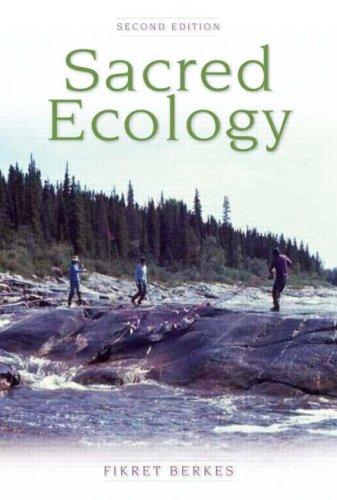 Rivers Like Tears Rivers Like Tears
A book review
by Sylvie Shaw
Fikret Berkes - Sacred Ecology
I picked up Fikret Berkes Sacred Ecology first because of its title. I was in the midst of writing a proposal for a course in sacred ecology and the book’s title seemed intriguing. It was not the only coincidence. I discovered the author, who is Professor of Natural Resources at the University of Manitoba, had done his field work in Northern Quebec, with the James Bay Cree.
A few years ago, I had travelled to the area and stayed with the Cree in the place Berkes mentions, Chisasabi, when I went dog sledding. It was a journey I had wanted to do since I was 10 years old - following the caribou on their annual migrations. But there was a big difference in dreaming about this trip for so long and the reality. By the time I got there, the ecology of the region had been terribly affected by the building of gigantic hydro-dams. This impacted on the quality of the lives of the people and of the land.
Before I left I had read how the flooding of vast tracts of the land has caused wide-spread mercury poisoning. Quantities of natural mercury from the soil has contaminated the rivers and the fish and poisoned the people who rely largely on fish for food. Margaret Sam-Cromarty (1992), a Cree poet whose house we stayed in at Chisasibi, laments these changes in her moving poem "Rivers"
Tears are like rivers;
they never stop flowing.
Rivers are like tears
they become dry.
Read more...
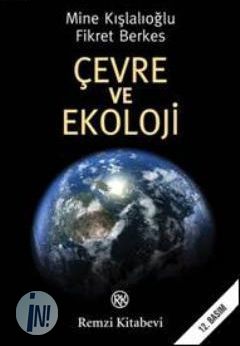 |
|
|
Çevre ve ekoloji konuları herkesin günlük hayatını temelden ilgilendiriyor. Bu konularda Türkiye'yi ele alan, özgün ve genel okur kitlesine ulaşabilecek bir kitap şimdiye kadar yazılmamıştı. Elinizdeki kitap işte bu boşluğu doldurmayı amaçlıyor. "Öyle bilimler vardır ki, hiç olmazsa genel kuralları ve nitelikleriyle herkesin bilmesi gerekir. Bilsek de bilmesek de, istesek de istemesek de, nasıl havanın içinde yaşıyorsak, bu bilimlerin de içindeyizdir ve bu bilimlerin yasalarına, kurallarına göre yönetilip yaşamaktayızdır. Ekoloji de böyle bir bilimdir." "Bir bilimcinin, halklaştırılmış bir yapıt yazması, bilimsel yazmasından çok daha zordur. Çünkü bilimi halklaştırmak için, önce o bilimi gerçekten çok iyi bilmek, sonra kendisine anlatılacak halkı çok iyi bilmek gerekir."
Dr. Mine Kışlalıoğlu'yla Dr. Fikret Berkes, uzmanı oldukları çevrebilimini ve bunu anlatacakları Türk halkını çok iyi bildikleri için, konunun dışında kalan bizim hepimizin anlayabileceğimiz ve ilgiyle okuyabileceğimiz bir yapıt vermişler.''
|
|
|
|
|
|
|
|
Page 2 of 7 |




 Books
Books




 Rivers Like Tears
Rivers Like Tears 


